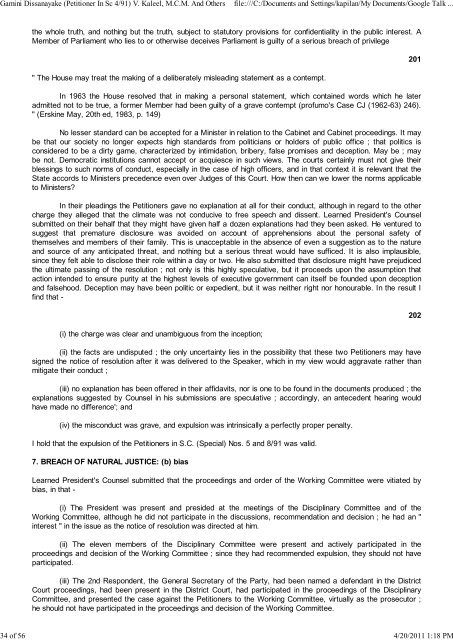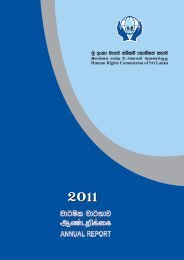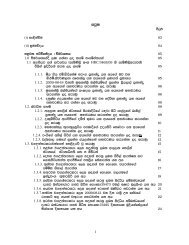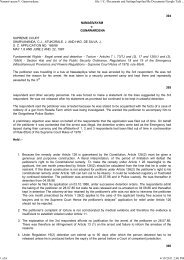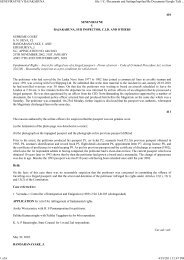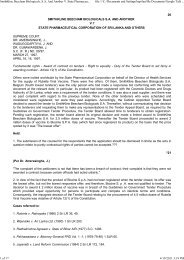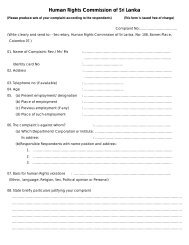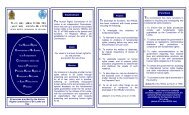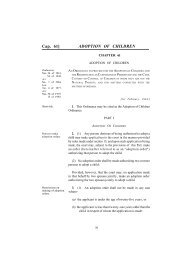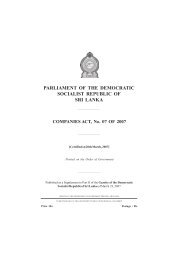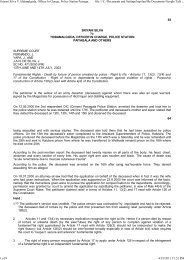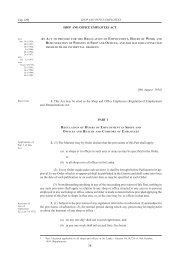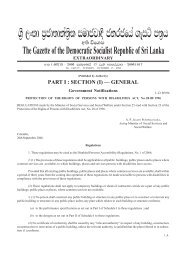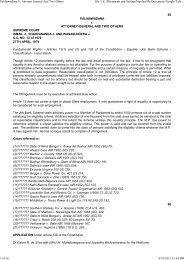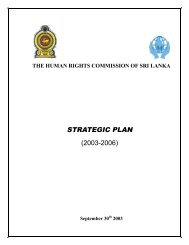Gamini Dissanayake (Petitio... - Human Rights Commission of Sri ...
Gamini Dissanayake (Petitio... - Human Rights Commission of Sri ...
Gamini Dissanayake (Petitio... - Human Rights Commission of Sri ...
You also want an ePaper? Increase the reach of your titles
YUMPU automatically turns print PDFs into web optimized ePapers that Google loves.
<strong>Gamini</strong> <strong>Dissanayake</strong> (<strong>Petitio</strong>ner In Sc 4/91) V. Kaleel, M.C.M. And Others file:///C:/Documents and Settings/kapilan/My Documents/Google Talk ...<br />
the whole truth, and nothing but the truth, subject to statutory provisions for confidentiality in the public interest. A<br />
Member <strong>of</strong> Parliament who lies to or otherwise deceives Parliament is guilty <strong>of</strong> a serious breach <strong>of</strong> privilege<br />
" The House may treat the making <strong>of</strong> a deliberately misleading statement as a contempt.<br />
In 1963 the House resolved that in making a personal statement, which contained words which he later<br />
admitted not to be true, a former Member had been guilty <strong>of</strong> a grave contempt (pr<strong>of</strong>umo's Case CJ (1962-63) 246).<br />
" (Erskine May, 20th ed, 1983, p. 149)<br />
No lesser standard can be accepted for a Minister in relation to the Cabinet and Cabinet proceedings. It may<br />
be that our society no longer expects high standards from politicians or holders <strong>of</strong> public <strong>of</strong>fice ; that politics is<br />
considered to be a dirty game, characterized by intimidation, bribery, false promises and deception. May be ; may<br />
be not. Democratic institutions cannot accept or acquiesce in such views. The courts certainly must not give their<br />
blessings to such norms <strong>of</strong> conduct, especially in the case <strong>of</strong> high <strong>of</strong>ficers, and in that context it is relevant that the<br />
State accords to Ministers precedence even over Judges <strong>of</strong> this Court. How then can we lower the norms applicable<br />
to Ministers?<br />
In their pleadings the <strong>Petitio</strong>ners gave no explanation at all for their conduct, although in regard to the other<br />
charge they alleged that the climate was not conducive to free speech and dissent. Learned President's Counsel<br />
submitted on their behalf that they might have given half a dozen explanations had they been asked. He ventured to<br />
suggest that premature disclosure was avoided on account <strong>of</strong> apprehensions about the personal safety <strong>of</strong><br />
themselves and members <strong>of</strong> their family. This is unacceptable in the absence <strong>of</strong> even a suggestion as to the nature<br />
and source <strong>of</strong> any anticipated threat, and nothing but a serious threat would have sufficed. It is also implausible,<br />
since they felt able to disclose their role within a day or two. He also submitted that disclosure might have prejudiced<br />
the ultimate passing <strong>of</strong> the resolution ; not only is this highly speculative, but it proceeds upon the assumption that<br />
action intended to ensure purity at the highest levels <strong>of</strong> executive government can itself be founded upon deception<br />
and falsehood. Deception may have been politic or expedient, but it was neither right nor honourable. In the result I<br />
find that -<br />
(i) the charge was clear and unambiguous from the inception;<br />
(ii) the facts are undisputed ; the only uncertainty lies in the possibility that these two <strong>Petitio</strong>ners may have<br />
signed the notice <strong>of</strong> resolution after it was delivered to the Speaker, which in my view would aggravate rather than<br />
mitigate their conduct ;<br />
(iii) no explanation has been <strong>of</strong>fered in their affidavits, nor is one to be found in the documents produced ; the<br />
explanations suggested by Counsel in his submissions are speculative ; accordingly, an antecedent hearing would<br />
have made no difference'; and<br />
(iv) the misconduct was grave, and expulsion was intrinsically a perfectly proper penalty.<br />
I hold that the expulsion <strong>of</strong> the <strong>Petitio</strong>ners in S.C. (Special) Nos. 5 and 8/91 was valid.<br />
7. BREACH OF NATURAL JUSTICE: (b) bias<br />
Learned President's Counsel submitted that the proceedings and order <strong>of</strong> the Working Committee were vitiated by<br />
bias, in that -<br />
(i) The President was present and presided at the meetings <strong>of</strong> the Disciplinary Committee and <strong>of</strong> the<br />
Working Committee, although he did not participate in the discussions, recommendation and decision ; he had an "<br />
interest " in the issue as the notice <strong>of</strong> resolution was directed at him.<br />
(ii) The eleven members <strong>of</strong> the Disciplinary Committee were present and actively participated in the<br />
proceedings and decision <strong>of</strong> the Working Committee ; since they had recommended expulsion, they should not have<br />
participated.<br />
(iii) The 2nd Respondent, the General Secretary <strong>of</strong> the Party, had been named a defendant in the District<br />
Court proceedings, had been present in the District Court, had participated in the proceedings <strong>of</strong> the Disciplinary<br />
Committee, and presented the case against the <strong>Petitio</strong>ners to the Working Committee, virtually as the prosecutor ;<br />
he should not have participated in the proceedings and decision <strong>of</strong> the Working Committee.<br />
34 <strong>of</strong> 56 4/20/2011 1:18 PM<br />
201<br />
202


